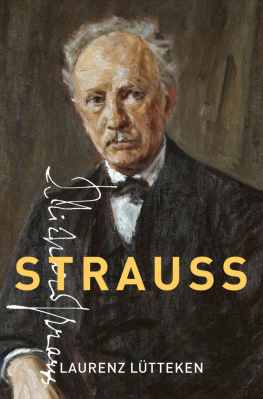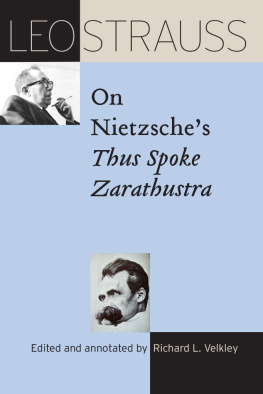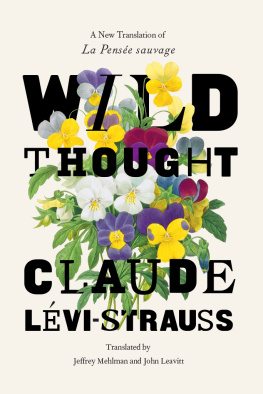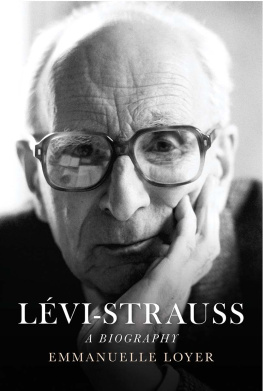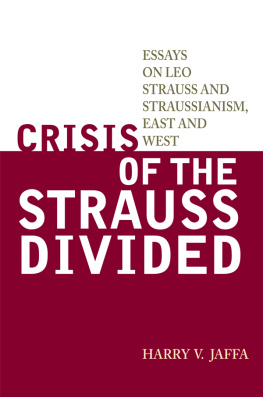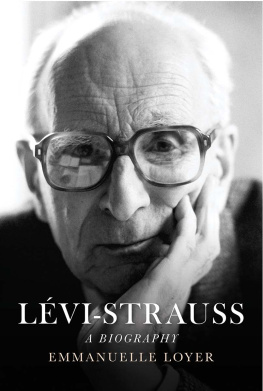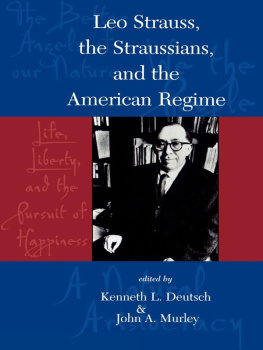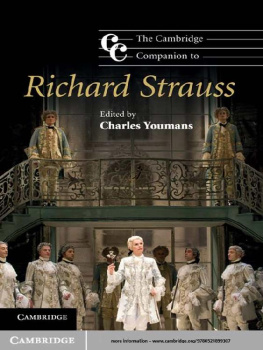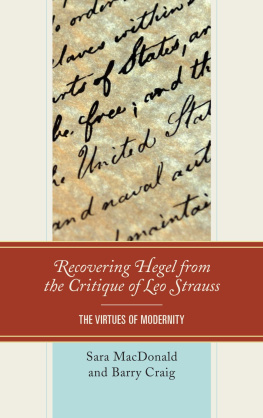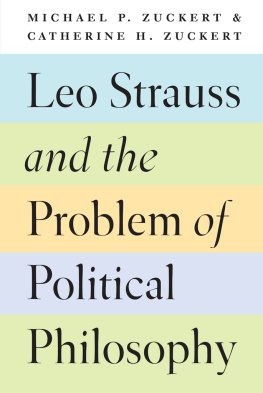THE MASTER MUSICIANS
STRAUSS
SERIES EDITED BY R. LARRY TODD
THE MASTER MUSICIANS
Titles Available
| Bach Malcolm Boyd | Mendelssohn Philip Radcliffe |
| Beethoven Barry Cooper | Monteverdi Dennis Arnold |
| Berlioz Hugh Macdonald | Mozart Julian Rushton |
| Brahms Malcolm MacDonald | Mussorgsky David Brown |
| Byrd Kerry McCarthy | Puccini Julian Budden |
| Carter David Schiff | Rossini Richard Osborne |
| Chopin Jim Samson | Schoenberg Malcolm MacDonald |
| Debussy Eric Frederick Jensen | Schumann Erik Frederick Jensen |
| Handel Donald Burrows | Strauss Laurenz Ltteken |
| Liszt Derek Watson | Tchaikovsky Roland John Wiley |
| MacDowell E. Douglas Bomberger | Verdi Julian Budden |
| Mahler Michael Kennedy | Vivaldi Michael Talbot |
THE MASTER MUSICIANS
STRAUSS

LAURENZ LTTEKEN
Translated by Erik Butler


Oxford University Press is a department of the University of Oxford. It furthers the Universitys objective of excellence in research, scholarship, and education by publishing worldwide. Oxford is a registered trade mark of Oxford University Press in the UK and certain other countries.
Published in the United States of America by Oxford University Press
198 Madison Avenue, New York, NY 10016, United States of America.
Philipp Reclam jun. GmbH & Co. KG 2014
All rights reserved. No part of this publication may be reproduced, stored in a retrieval system, or transmitted, in any form or by any means, without the prior permission in writing of Oxford University Press, or as expressly permitted by law, by license, or under terms agreed with the appropriate reproduction rights organization. Inquiries concerning reproduction outside the scope of the above should be sent to the Rights Department, Oxford University Press, at the address above.
You must not circulate this work in any other form and you must impose this same condition on any acquirer.
Library of Congress Cataloging-in-Publication Data
Names: Ltteken, Laurenz, author.
Title: Strauss / Laurenz Ltteken.
Other titles: Richard Strauss. English
Description: New York, NY : Oxford University Press, [2019] | Series: Master musicians | Translated from the German published under title: Richard Strauss. | Includes bibliographical references and index.
Identifiers: LCCN 2018027781 | ISBN 9780190605698 (hardcover : alk. paper) |ISBN 9780190605711 (epub)
Subjects: LCSH: Strauss, Richard, 18641949Criticism and interpretation.
Classification: LCC ML410.S93 L8813 2019 | DDC 780.92dc23 LC record available at https://lccn.loc.gov/2018027781
With the support of the UBS Culture Foundation and Legat Dr Wilhelm Jerg, University of Zurich
Contents
S ince the 1950s, increasing doubt has come to bear on whether Richard Strauss qualifies as modern (and not just in a musical sense). There are many reasons for this. Even in the context of the emergent New Music first hailed by Paul Bekker, which reveled in proclamations and prophecies, Strauss offers an atypical example. Resolutely and persistently, he refused to provide the kind of commentary that others offered so readily. The mass of writings he left behind amounts to little more than marginalia and occasional remarks; in no way does it present a systematic account of his artistic purposes. Even the journalistic controversy surrounding Salome (1905) failed to move the composer to explain himself, and he positively despised such inclinations in his contemporaries. Accordingly, works of central importancefor instance, Der Rosenkavalier (1911)stand without authorial explanation to accompany them. The only programmatic statement on the pieces background is a short essayistic sketch. Tellingly, it was written by Hugo von Hoffmannsthal, who gave it the paradoxical title, Unwritten Afterword. The only time both authors felt obliged to make statements (which took very different forms) was in the context of Die gyptische Helena (1928); in the event, there are highly specific circumstances for this exception.
Strauss was an avid reader, yet he hid his humanist education. His personality remained unapproachable because he did not so much as hint at how to interpret his works, although it seems that many include a sizeable biographical component. Even Hofmannsthal said that he came to understand the overarching connections in Strausss oeuvre only after lengthy, oral expositionthat is, following conversations that were private and were meant to stay so. Strauss never saw fit to write down what he thought on such subjects. The only text expressing a genuine worldview comes from the most personal, intimate sphere: his 1892 and 1893 diary, written during his formative journey to Egypt and Greece, taken for health reasons. Strausss contemporaries were unaware of this journal, however; it was made available by Willi Schuh only laterand then only in parts. Strausss personal reserve proves all the more remarkable given the dauntingly systematic nature that he lent his lifes work, which encompasses nearly eighty years of active composition. Unfolding between two polestone poems and operasit is framed by early contributions to traditional, instrumental genres and explicitly classified late works. Significantly, alongside this prodigious output was also a constant, if not uniformly intensive, stream of Lieder. Strausss breaks with his system are rare; examples include the piano works for Paul Wittgenstein and Intermezzo (1924), which abandons certain principles observed elsewhere. Yet these compositions complex relations to the overall system do not question it so much as affirm its validity.
Strauss made considerable effort to embody the roles of composer and conductor in onea unity that had, in fact, fallen apart after Wagner. On this score, he invites comparison with Mahler. At the same time, however, Strauss differs from his contemporary for having renouncedand just as emphaticallythe Wagnerian fusion of composer and librettist. Apart from a masterclass that proved just as short-lived as it was half-hearted, Strauss is the only major composer in the German-speaking world around the turn of the century to have eschewed teaching; he never sought to train pupils or gather disciples, and he avoided a conservatory professorship to the end. He also remained unapproachable by never explaining his methods in technical terms. The only time that he deigned to offer a positionin a provisional account of his life made in conjunction with Ein Heldenleben (1899)he did so indirectly, by adapting Hector Berliozs Trait dinstrumentation (1904).
A further aspect of this self-occultation is evident in the strange phenomenon connecting Strauss, the great anti-metaphysican, and Anton Bruckner (18241896), the exemplary metaphysician of music. Endless anecdotes have been told by third parties, many of which take manifest delight in gossip and intrigue. Out of such second-hand accounts a kind of leitmotif emerges: the composers unconscious, inborn musicianship and his love of playing cards. Yet the image does not reveal character traits so much as it covers them up. One may deem Strausss pose a technique for avoiding, once and for all, the importunities of contemporaries who were positively infatuated with personal revelations. Even though he hardly suffered from a lack of self-confidence and was given to jovial moodsif not brash expressions of pride in his successthis refined intellectual screened himself off in his Garmisch library (which remains largely preserved to this day). Although a public figure through and through, Strauss kept the public at arms length. This lifelong bearing also proves confusing inasmuch as heand in this regard he was like Paul Hindemith, Dmitri Shostakovich, or Darius Mulhauddemonstrated incessant, often beserker-like, creative vigor; this occasionally, as in the decade from 1909 to 1919, assumed almost incomprehensible dimensions.
Next page
